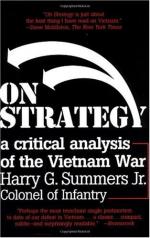|
This section contains 3,469 words (approx. 12 pages at 300 words per page) |

|
SOURCE: "England, Education, and the Future," in Anthony Burgess, Twayne, 1972, pp. 96-118.
DeVitis is an American critic and educator. In the following excerpt, he interprets A Clockwork Orange as a black comedy which illustrates the "horror of life without choice."
In a chapter entitled "Utopias and Dystopias" in The Novel Now, Anthony Burgess appraises the influence of H. G. Wells on the modern utopian novel:
Many novelists set themselves the task—before and after the war—of exposing Wells's optimistic scientific liberalism as a sham. Science and education, said Wells, would outlaw war, poverty, squalor. All of us carry an image of the Wellsian future—rational buildings of steel and glass, rational tunics, clean air, a diet of scientifically balanced vitamin-capsules, clean trips to the moon, perpetual world peace. It was a fine dream, and what nation could better realise it than the Germans? After all, their scientific...
|
This section contains 3,469 words (approx. 12 pages at 300 words per page) |

|


